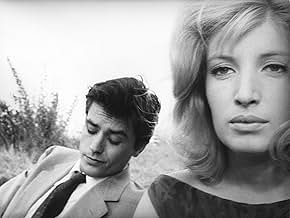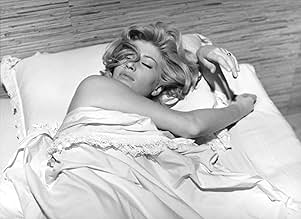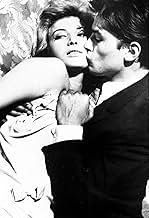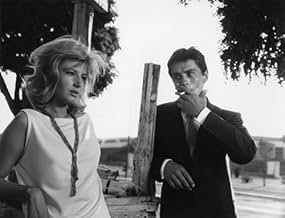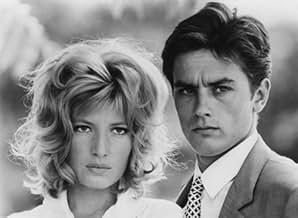VALUTAZIONE IMDb
7,7/10
23.482
LA TUA VALUTAZIONE
La storia d'amore di una ragazza non è destinata a durare a causa della natura materialistica dell'uomo con cui ha una relazione.La storia d'amore di una ragazza non è destinata a durare a causa della natura materialistica dell'uomo con cui ha una relazione.La storia d'amore di una ragazza non è destinata a durare a causa della natura materialistica dell'uomo con cui ha una relazione.
- Regia
- Sceneggiatura
- Star
- Premi
- 1 vittoria e 5 candidature totali
Cyrus Elias
- Intoxicated Man
- (non citato nei titoli originali)
Alba Maiolini
- Woman at the Stock Market
- (non citato nei titoli originali)
Maria Tedeschi
- Woman with Glasses at the Stock Market
- (non citato nei titoli originali)
Recensioni in evidenza
While The Eclipse is one of the most superbly directed films I may have ever seen, on a first impression it was (obviously) a lot to take in all at once. As with his other films, L'Eclisse isn't for everyone. But Antonioni distinguishes himself here as a great artist of the medium by not only creating the kinds of compositions (lensed by Gianni De Venanzo, who worked with Antonioni on Il Grido and La Notte as well as the WW2 documentary Days of Glory and Fellini's 8 1/2) no one could ever justifiably imitate correctly, but creating a depth to the substance. On one hand one aspect of L'Eclisse that's appealing is how it balances out the style and substance (though the style is arguably the more distinguishable and greater than the two). On the other another aspect is that it could put off viewers not terribly familiar with Antonioni's psychology (which, like Scorsese for example, is at least consistent and engaging with the rest of the director's catalog of work). How intently he gets inside Vittoria's head, and at the same time maintains a detachment despite the varying emotional contexts, is extraordinary, if highly personal.
Like Vittoria, Antonioni does something that's fascinating throughout the film - though one doesn't know what it is exactly that holds Vittoria, and for that matter Piero, in their respective attitudes, one doesn't feel quite left out of anything heart-stopping for the story/character's sake. The film lets us in just enough as to no keep us curious, and it also doesn't keep itself in a depressive tone, as it is realistic to how the people in this city exist. In fact, there's another facet to L'Eclisse which especially worked for me - the poetry that slips itself in small doses amid the visual sweep. Whether it be one of the long takes, an elongated view on a building or street-light, or on Vitty as Vittoria, it's in the observation that subtext forms. This is the kind of motion picture that a shot-by-shot analysis would serve like would a Picasso or Chagal.
And as a plus to the film's success are the actors turns - Monica Vitti is the only actress from that period and country I can think of who could've pulled off what Antonioni wanted in Vittoria. Her face, after being in front of us minute after minute, becomes familiar despite her inner-angst. She knows what Vittoria's fears and loss of vitality means for the story. She's not a person without a laugh or smile ever, yet those emotions arrive only after the known mood is peeled away like a layer of skin. "To love I think one shouldn't know the other," she says, almost arbitrarily. "But then, maybe one shouldn't love at all." Is this Antonioni hitting the hammer on the head, or is it just one of those kinds of comments a woman like her would make? As in L'Avventura, there is the mystery around the female lead. Is love beyond her reach we might wonder, or has the idea of it vanished under false pretense? Alain Deleon also deserves credit for his Piero, as he counters her quiet, more fogged demeanor as a stockbroker in Rome. That under current to the story - the major bustle and noise of the gamblers in the stockbroker's hall - is also part of the contrast, to the stretches with minimal dialog and sound.
The last act, which regards Vittoria's relationship to Piero (a time after he empty break-up with her past lover Rodrigo) culminates in an astonishing feat of storytelling and film-art. As it becomes all the more evident neither one will arrive at a certain (usually) desolate cross-road corner to meet up, the idea of an eclipse over these people and places is hypnotic, unique. For its time it must've been quite a stroke by a director, and forty or so years later the whole sequence leaves its effect in due. Haunting formations beneath and surrounded by the sky and clouds, and it's a bit intellectually loaded. There can be any interpretation for this climax (or as one could claim an anti-climax) that isn't manipulated by Antonioni. The sequence, as with the rest of the film, asks only to see the world based on how one would think it can, or will, be seen. And it fits memorably, like bedroom slippers, into the prime of Antonioni's career as an auteur.
Among the three films in Antonioni's films from this period of his career (1960-1962), this is the one I'd recommend the highest. The Eclipse is also the kind that's nearly mandatory to see more than once if sincerely interested in checking out at all (in other words, don't watch it with pre-conceived notions of this being a dramatic love story with solid conventions to it).
Like Vittoria, Antonioni does something that's fascinating throughout the film - though one doesn't know what it is exactly that holds Vittoria, and for that matter Piero, in their respective attitudes, one doesn't feel quite left out of anything heart-stopping for the story/character's sake. The film lets us in just enough as to no keep us curious, and it also doesn't keep itself in a depressive tone, as it is realistic to how the people in this city exist. In fact, there's another facet to L'Eclisse which especially worked for me - the poetry that slips itself in small doses amid the visual sweep. Whether it be one of the long takes, an elongated view on a building or street-light, or on Vitty as Vittoria, it's in the observation that subtext forms. This is the kind of motion picture that a shot-by-shot analysis would serve like would a Picasso or Chagal.
And as a plus to the film's success are the actors turns - Monica Vitti is the only actress from that period and country I can think of who could've pulled off what Antonioni wanted in Vittoria. Her face, after being in front of us minute after minute, becomes familiar despite her inner-angst. She knows what Vittoria's fears and loss of vitality means for the story. She's not a person without a laugh or smile ever, yet those emotions arrive only after the known mood is peeled away like a layer of skin. "To love I think one shouldn't know the other," she says, almost arbitrarily. "But then, maybe one shouldn't love at all." Is this Antonioni hitting the hammer on the head, or is it just one of those kinds of comments a woman like her would make? As in L'Avventura, there is the mystery around the female lead. Is love beyond her reach we might wonder, or has the idea of it vanished under false pretense? Alain Deleon also deserves credit for his Piero, as he counters her quiet, more fogged demeanor as a stockbroker in Rome. That under current to the story - the major bustle and noise of the gamblers in the stockbroker's hall - is also part of the contrast, to the stretches with minimal dialog and sound.
The last act, which regards Vittoria's relationship to Piero (a time after he empty break-up with her past lover Rodrigo) culminates in an astonishing feat of storytelling and film-art. As it becomes all the more evident neither one will arrive at a certain (usually) desolate cross-road corner to meet up, the idea of an eclipse over these people and places is hypnotic, unique. For its time it must've been quite a stroke by a director, and forty or so years later the whole sequence leaves its effect in due. Haunting formations beneath and surrounded by the sky and clouds, and it's a bit intellectually loaded. There can be any interpretation for this climax (or as one could claim an anti-climax) that isn't manipulated by Antonioni. The sequence, as with the rest of the film, asks only to see the world based on how one would think it can, or will, be seen. And it fits memorably, like bedroom slippers, into the prime of Antonioni's career as an auteur.
Among the three films in Antonioni's films from this period of his career (1960-1962), this is the one I'd recommend the highest. The Eclipse is also the kind that's nearly mandatory to see more than once if sincerely interested in checking out at all (in other words, don't watch it with pre-conceived notions of this being a dramatic love story with solid conventions to it).
L'Eclisse (1962) is a profoundly artistic, wonderfully crafted modern Italian film, in which the audience is permitted to draw their own conclusions about what they are seeing on the screen.
Unlike most directors, who construct their films in very specific, traditional ways to tell stories they wish to convey, in L'Eclisse the director Michelangelo Antonioni paints pictures which mean different things to different people. It's an open-ended story and the audience is allowed and actually encouraged to come up with their own theories about the main plot and sub-plots, the overall themes, and the characters' motivations and personalities. None of them are carved in stone. You yourself can travel to a very special, unique place by watching L'Eclisse, and it can be a very different journey than someone else's.
What do the white lines mean to you? They show up several times in compositional frames in the film: on the street, on the runway when the plane lands, outside a church, and in more abstract ways in signposts, in clothing, in architecture. Is an actual eclipse taking place when darkness descends and the street light suddenly goes on? or has nighttime simply fallen and we're left with a sense of desolation and obliteration of the modern city? has the city been hit by a nuclear bomb? The mushroom water tower: does it just signify the nuclear age, or is it a real omen for the future of mankind? Is it not also a phallic symbol, showcasing the director's idea that the stockbroker character is primarily interested in towering conquests, and that sexuality is an underlying motivation of the main female character's psyche, even though she also seems afraid of intimacy and commitment? The man riding the horse and buggy and the nursemaid pushing the baby buggy: do these things just mark the passage of time? or do they have a deeper meaning that represents the old world, a world that is quickly disappearing from the modern landscape? Is the final scene between the couple the end of their relationship, or are they about to become more serious? Questions like these can be answered in different ways, depending on your own perspective.
This was a novel approach to film-making in 1962, and actually it's also still novel today too! How many films dare to resemble L'Eclisse in the 21st century? Today films are too formulaic and rarely is the same creativity expressed that Michelangelo Antonioni achieved so sublimely in his film. If I was a filmmaker this would be the kind of film I would love to make, full of symbolism and repressed emotions.
The cinematography is exquisite in this film. The new Criterion double disc set did a fantastic job with the print and the extras. My suggestion would be to watch the film without commentary and then immediately afterward watch it again with the commentary on. As he talks you will find yourself noticing things you missed the first time around, and that the commentator is missing too! For instance, notice how in the scene when the ladies are chasing the dogs who have escaped the apartment, that Vittoria approaches two dogs, a white and a black one, and it's the black dog who gets up and dances and charms her, an analogy to the previous scene, in which Vittoria had put on black-face and did an African dance in her racist friend's apartment. The white dog blithely walks away, representing the stifling racist views of her friend Marta, and the black dog shows joy of movement and a fun nature, like Vittoria. The commentator completely misses this message.
Acting is superb by all three leads, Monica Vitti, with her finely chiseled face and wild blonde hair, Alain Delon, who conveys emotions easily with just the flick of an eyebrow, and Francisco Rabal, classically handsome and intense. Also of note is the actress who plays Vittoria's mother, Lila Brignone, who does a good job depicting the emotional distance the character feels from the estranged daughter, which in turn conveys to the audience one of the primary reasons Vittoria is afraid of intimacy: she never had a demonstrative relationship with her mother.
If you're a fan of Italian cinema, don't miss L'Eclisse. It's a special film which will stay with you long after you've seen it.
10 out of 10.
Unlike most directors, who construct their films in very specific, traditional ways to tell stories they wish to convey, in L'Eclisse the director Michelangelo Antonioni paints pictures which mean different things to different people. It's an open-ended story and the audience is allowed and actually encouraged to come up with their own theories about the main plot and sub-plots, the overall themes, and the characters' motivations and personalities. None of them are carved in stone. You yourself can travel to a very special, unique place by watching L'Eclisse, and it can be a very different journey than someone else's.
What do the white lines mean to you? They show up several times in compositional frames in the film: on the street, on the runway when the plane lands, outside a church, and in more abstract ways in signposts, in clothing, in architecture. Is an actual eclipse taking place when darkness descends and the street light suddenly goes on? or has nighttime simply fallen and we're left with a sense of desolation and obliteration of the modern city? has the city been hit by a nuclear bomb? The mushroom water tower: does it just signify the nuclear age, or is it a real omen for the future of mankind? Is it not also a phallic symbol, showcasing the director's idea that the stockbroker character is primarily interested in towering conquests, and that sexuality is an underlying motivation of the main female character's psyche, even though she also seems afraid of intimacy and commitment? The man riding the horse and buggy and the nursemaid pushing the baby buggy: do these things just mark the passage of time? or do they have a deeper meaning that represents the old world, a world that is quickly disappearing from the modern landscape? Is the final scene between the couple the end of their relationship, or are they about to become more serious? Questions like these can be answered in different ways, depending on your own perspective.
This was a novel approach to film-making in 1962, and actually it's also still novel today too! How many films dare to resemble L'Eclisse in the 21st century? Today films are too formulaic and rarely is the same creativity expressed that Michelangelo Antonioni achieved so sublimely in his film. If I was a filmmaker this would be the kind of film I would love to make, full of symbolism and repressed emotions.
The cinematography is exquisite in this film. The new Criterion double disc set did a fantastic job with the print and the extras. My suggestion would be to watch the film without commentary and then immediately afterward watch it again with the commentary on. As he talks you will find yourself noticing things you missed the first time around, and that the commentator is missing too! For instance, notice how in the scene when the ladies are chasing the dogs who have escaped the apartment, that Vittoria approaches two dogs, a white and a black one, and it's the black dog who gets up and dances and charms her, an analogy to the previous scene, in which Vittoria had put on black-face and did an African dance in her racist friend's apartment. The white dog blithely walks away, representing the stifling racist views of her friend Marta, and the black dog shows joy of movement and a fun nature, like Vittoria. The commentator completely misses this message.
Acting is superb by all three leads, Monica Vitti, with her finely chiseled face and wild blonde hair, Alain Delon, who conveys emotions easily with just the flick of an eyebrow, and Francisco Rabal, classically handsome and intense. Also of note is the actress who plays Vittoria's mother, Lila Brignone, who does a good job depicting the emotional distance the character feels from the estranged daughter, which in turn conveys to the audience one of the primary reasons Vittoria is afraid of intimacy: she never had a demonstrative relationship with her mother.
If you're a fan of Italian cinema, don't miss L'Eclisse. It's a special film which will stay with you long after you've seen it.
10 out of 10.
L'Eclisse (1962)***1/2
Third film in Antonioni's trilogy of alienation following L'Avventura (1960) and La Notte (1961) about a young woman (Monica Vitti) and her brief affair with handsome Alain Delon.
Like in his other movies, Antonioni uses specific techniques not to tell the story but rather to express the lack of communication among the characters, their alienation and incapableness to make a strong and meaningful relation. May this be because of their shallow characters or as a result of living in a modern society marked with the superficial values like prestigious and run-for-the-money it's up to the viewer to decide. Anyway, long cadres, real time events, visual metaphors and visual contrasts between the characters on the one side and landscapes and/or modern day creations like buildings, streets (usually empty) on the other is what makes this rather experience than a plot-movie (intentionally) but nevertheless effective in their purpose (which is to express and transmit this same feelings of alienation to the viewer). So, if you're looking for an entertainment, you better skip this one. Final scene is great in concluding the movie. A bit weaker of great L'Avventura.
Third film in Antonioni's trilogy of alienation following L'Avventura (1960) and La Notte (1961) about a young woman (Monica Vitti) and her brief affair with handsome Alain Delon.
Like in his other movies, Antonioni uses specific techniques not to tell the story but rather to express the lack of communication among the characters, their alienation and incapableness to make a strong and meaningful relation. May this be because of their shallow characters or as a result of living in a modern society marked with the superficial values like prestigious and run-for-the-money it's up to the viewer to decide. Anyway, long cadres, real time events, visual metaphors and visual contrasts between the characters on the one side and landscapes and/or modern day creations like buildings, streets (usually empty) on the other is what makes this rather experience than a plot-movie (intentionally) but nevertheless effective in their purpose (which is to express and transmit this same feelings of alienation to the viewer). So, if you're looking for an entertainment, you better skip this one. Final scene is great in concluding the movie. A bit weaker of great L'Avventura.
It only takes a few films to become familiar with the methodic ways of Michelangelo Antonioni. Themes of alienation, disconnection, romance without the romance and dealing with an ambiguous existential way of life. It's fascinating but challenging. I came into L'Eclisse wanting to love it because I love L'Avventura and Blowup but deliberately hard to connect to. We're thrown into a vague but disheartening scenario with depressed characters and just have to follow down that road. It has rich cinematography that has beautiful composition, but an gut- sinking emptiness. It's almost too precise and too self-aware. But that's the beauty of the film, its aesthetic is not supposed to be pleasing, even though artistically it should be. In fact, it's painful. Painful to watch the busiest life of the film being at the stock market while the rest of nature is desolate yet so picturesque. Machines and technology are prominent throughout the film and often physically get in the way of human relationships. The film is a profound and quietly poignant statement on human desires and insecurities, if a little held back by a touch of pretence and too cold for its own good.
8/10
8/10
The Eclipse denotes Michelangelo Antonioni 's flawless taste,and his powerful,virile instinct for strong compositions;this elegant and suave movie is one of the cinema's best pieces of poetry (I must also confess that I prefer this early,younger,"black and white" and peninsular Michelangelo Antonioni;he was 50 years when he made L'ECLISSE).Before he approached the '60s counterculture,Antonioni made a few strong movies not only for the intellectuals but also about intellectuals.
This one is an incredibly rich movie,a movie about many things:about solitude,financial pawns,a woman's indefinite aspirations,the vibrating city beauty,and the heart's resilience,the woman soul's density,the urban aesthetic;and also about:greed,people that search gropingly .Little wheels in the gearing of the stock exchange;the stock exchange's crushing machine.Antonioni is caustic and sober.His theme,the human monad,is inexhaustible.The naturalness,the charm,the intensity,the integrity,the width of this film must be mentioned.Antonioni proved that,for his cinema,experiments are always ways and means,while the most intense poetry is the aim.(Each great director is an experimenter;all great directors are experimenters,only to be better poets.)
Antonioni is one of the three directors who,according to Averty,never made a bad movie (and Antonioni's creation was,for almost two decades, quite abundant;it is only after Blowup (1966) that he went slow,making some seven movies in so many decades).His movies don't have a "sockdolager",that's part of what makes them so good and endearing.Experimenting in countless ways,Antonioni never forgot to be a poet,and never failed.His aesthetic aim has a side of ingenuity and directness that enchants in an unfailing way.
And what is Antonioni's poetry?It is this compact texture,this density of the people and of the life,the striking immediacy.It is amazing also how Antonioni put all of himself in this beautiful movie,The Eclipse.
Like a few others,The Eclipse is one of the movies that give us the taste of what cinema can be.
This one is an incredibly rich movie,a movie about many things:about solitude,financial pawns,a woman's indefinite aspirations,the vibrating city beauty,and the heart's resilience,the woman soul's density,the urban aesthetic;and also about:greed,people that search gropingly .Little wheels in the gearing of the stock exchange;the stock exchange's crushing machine.Antonioni is caustic and sober.His theme,the human monad,is inexhaustible.The naturalness,the charm,the intensity,the integrity,the width of this film must be mentioned.Antonioni proved that,for his cinema,experiments are always ways and means,while the most intense poetry is the aim.(Each great director is an experimenter;all great directors are experimenters,only to be better poets.)
Antonioni is one of the three directors who,according to Averty,never made a bad movie (and Antonioni's creation was,for almost two decades, quite abundant;it is only after Blowup (1966) that he went slow,making some seven movies in so many decades).His movies don't have a "sockdolager",that's part of what makes them so good and endearing.Experimenting in countless ways,Antonioni never forgot to be a poet,and never failed.His aesthetic aim has a side of ingenuity and directness that enchants in an unfailing way.
And what is Antonioni's poetry?It is this compact texture,this density of the people and of the life,the striking immediacy.It is amazing also how Antonioni put all of himself in this beautiful movie,The Eclipse.
Like a few others,The Eclipse is one of the movies that give us the taste of what cinema can be.
Alain Delon's Top 10 Films, Ranked
Alain Delon's Top 10 Films, Ranked
To celebrate the life and career of Alain Delon, the actor often credited with starring in some of the greatest European films of the 1960s and '70s, we rounded up his top 10 movies, ranked by IMDb fan ratings.
Lo sapevi?
- QuizThe Roman stock market scenes were filmed on Sundays when the market was closed. Real brokers were drafted to make it more convincing.
- Blooper(at around 1h 28 mins) Vittoria and Piero get wet from a sprinkler. The right side of Piero's jacket is wet. A minute later when they are listening to the piano player, the back of Vittoria's blouse is still wet, but Piero's jacket is dry.
- Versioni alternativeWest German theatrical version was cut by approx. three minutes.
- ConnessioniEdited into Dolce Vitti (2014)
I più visti
Accedi per valutare e creare un elenco di titoli salvati per ottenere consigli personalizzati
- How long is L'Eclisse?Powered by Alexa
Dettagli
Botteghino
- Lordo in tutto il mondo
- 5947 USD
- Tempo di esecuzione2 ore 6 minuti
- Colore
- Proporzioni
- 1.85 : 1
Contribuisci a questa pagina
Suggerisci una modifica o aggiungi i contenuti mancanti



